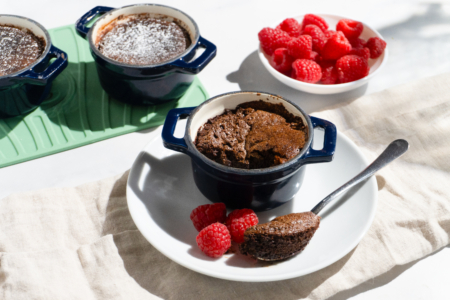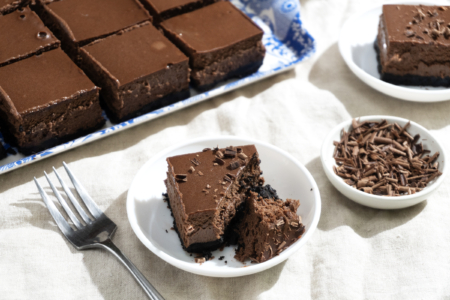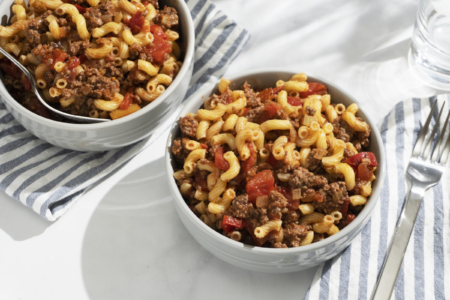A common fixture in steakhouses, strip steaks are prized by butchers (and customers) for their beefy flavor, tender texture, and intense marbleization. Strip steaks, or New York strip steaks as they’re sometimes called comes from the beef short loin primal. The short loin is muscle area that does very little work, as a result it’s home to many of the best beef cuts, including the tenderloin. Strip steak is a premium cut of meat with a premium price tag which can make it a daunting prospect for home cooking. That’s where sous vide comes in. Cooking strip steak using Suvie or sous vide allows you to cook the meat to the exact level of doneness without fail. All that’s required at the end is a quick sear and the resulting steak will be tender, juicy and absolutely packed with flavor.
Follow this simple guide to learn how to cook strip steak using Suvie and sous vide.
Temperature and cooking times for strip steak
| Temperature | Time | Result |
| 125°F* | 1 hour | Rare |
| 130°F | 1- 3 hours | Medium rare |
| 135°F | 1- 3 hours | Medium |
| 145°F | 1-3 hours | Medium Well |
| 150°F | 1 – 3 hours | Well done |
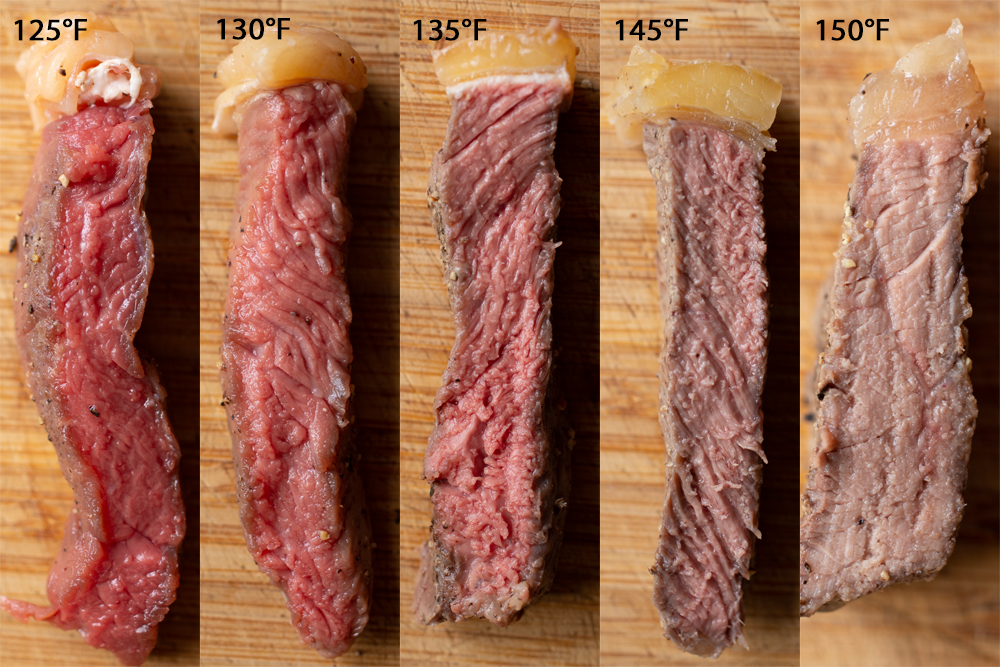
Like most sous vide meats, the longer you cook, the more tender your meat will become. Leaving the steak in the water bath for longer than 1-hour won’t cook the meat far beyond the desired doneness but it will affect the texture.
In terms of timing, our recommended cook times are based on a 1 ½ inch thick steak. Add around 30 minutes of cook time for every additional ½ inch of thickness.
Follow this link to find out more information about Suvie cooking times and temperatures.
Ingredients and Tools
- Strip Steak (at least 1 ½ inch thick)
- Salt
- Pepper
- Vegetable oil
Equipment
- Suvie or sous vide wand
- A large pot (if using a sous vide wand)
- Vacuum sealer and bags or Freezer safe recloseable bags
- A heavy, preferably cast iron, pan
Directions
If you’re using a sous vide wand, pre-heat your water bath to the desired temperature.

Season the steak generously on all sides with salt and pepper. Place the steak into the plastic bag and vacuum seal. If you’re using a recloseable bag, follow our guide on the water displacement method.

Lower the bag into the water bath and leave until cooked.
If you are using Suvie place the bag into a Suvie pan and cover completely with water. Place in Suvie and use the following settings:
Suvie Cook Settings
Bottom Zone: Sous Vide at 125-150°F for 1-3 hours (based on desired doneness)
Top Zone: Sous Vide at 125-150°F for 1-3 hours (based on desired doneness)
Once the cook is done remove the bag from your Suvie or water bath.
Finishing
Remove the steak from the bag and pat dry with paper towels.
Heat 1 tbsp vegetable oil in a cast-iron pan over high heat. Avoid using olive oil as it has a low smoke point.
Once the oil begins to smoke and shimmer, add the steak. and cook without moving for 15 seconds.
Flip steaks and repeat on the opposite side for 15 seconds. Continue flipping steaks in 15-second intervals until both sides are well browned.
Finally, sear the edges and the cap fat of the steak until browned.

Remove from heat and serve.
Recipes to try
Chimichurri Steak
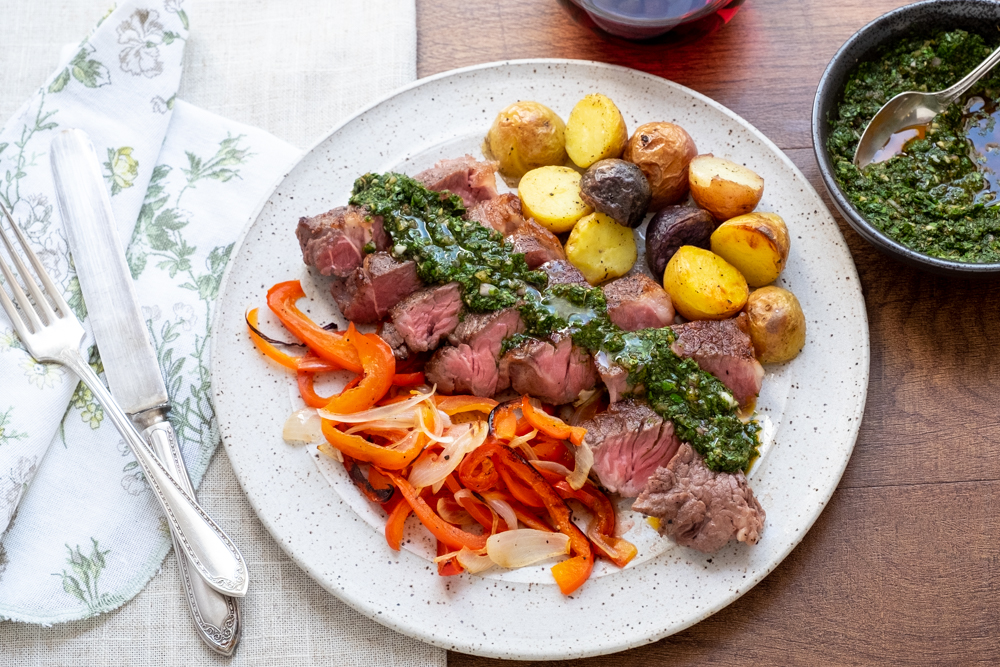
Steak au Poivre with Smashed Potatoes
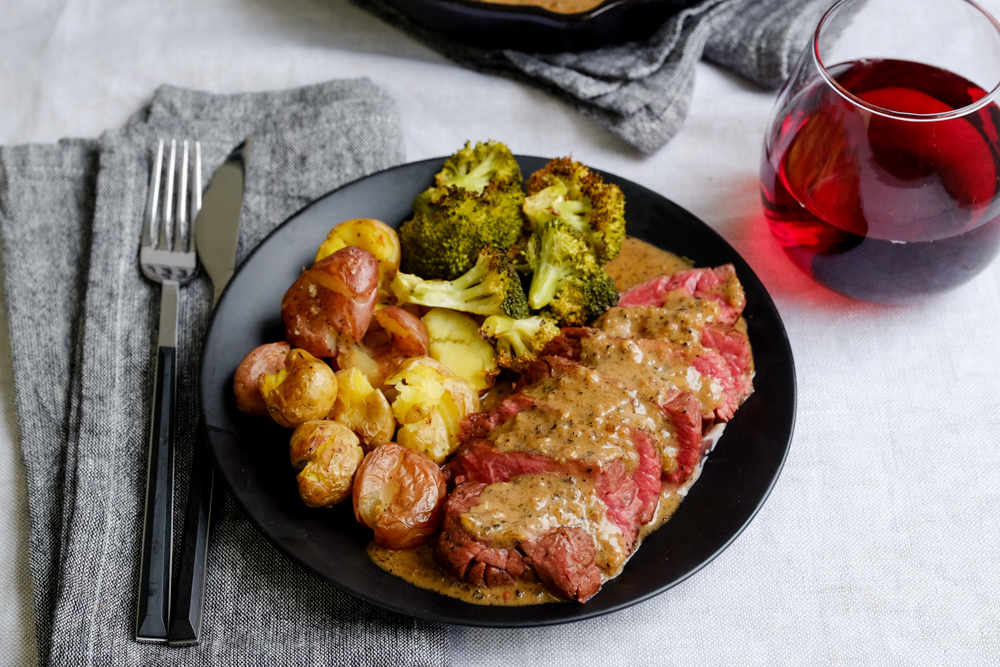
Seared Steak with Farro and Garlicky Broccoli Rabe

Seared Steak with Asparagus, Mashed Potatoes, and Romesco Sauce

Strip Steak with Roasted Brussels Sprouts and Sweet Potato Fries
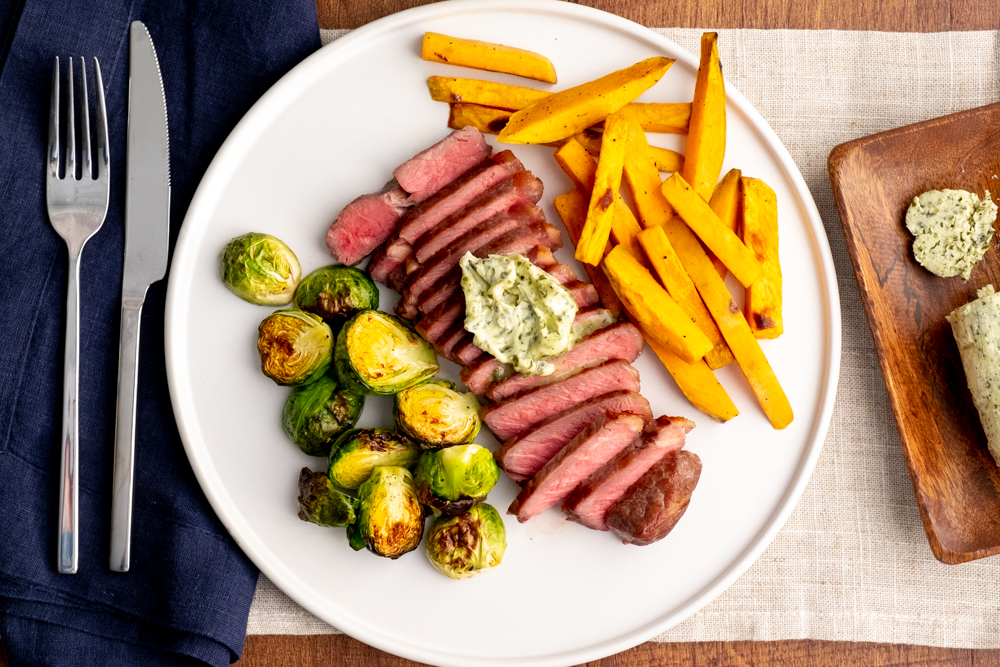
FAQs
Are the cooking temperatures safe?
Our recommended cooking temperatures for Sous vide and Suvie are lower than what the USDA recommends, however, cooking times and temperatures are long enough and high enough for “pasteurization” to make your food safe. The USDA recommendations indicate the temperature needed to instantly kill food pathogens. By cooking for a longer time at a lower temperature we are able to achieve the same effect. However, high-risk populations should use extra caution when preparing foods below the USDA recommended temperatures.
Where can I get vacuum sealed proteins?
If you don’t want to fuss with vacuum sealers and recloseable bags you can skip the store and order the Suvie Protein Box. Just put together your ideal combination of preseasoned, portioned, and vacuum-packed high-quality meat, poultry, or fish. We deliver it to you frozen in a carefully-packed box.
Can I use any type of plastic bag?
You can, however, make sure that they are made from polyethylene. Brand name recloseable bags are made using polyethylene which is a BPA and dioxin free plastic that can safely handle sous vide cooking temperatures up to 190°F. Some generic branded plastic bags are made using cheaper polyvinyl chloride (PVC) which cannot handle high temps and contains chemicals that can leach into food.
Should I leave my steak to rest before serving?
Nope! One of the great things about cooking with Suvie and sous vide is the evenness of temperature. While the outer edges will be hotter from the sear, the interior of the steak will be cooked to the same temperature throughout. This means no resting time is necessary.
I forgot to defrost my steak, what now?
No problem! You can sous vide steak directly from frozen. Just add 1 hour to the cooking time.
Can I cool my steak after the sous vide process and sear it later?
For food safety and general food quality reasons, we don’t recommend it. Steak should be seared and eaten soon after the sous vide step.
Do I have to pan sear my steak?
Nope! While pan-searing is a great way to enjoy steak, grilled is also a popular option. Simply grill your steak on a hot grill over direct heat for a minute each side. Other finishing methods include broiling and deep-frying
Can I leave my steak in the water bath indefinitely?
You can, but you shouldn’t. While leaving steak in sous vide for long periods of time won’t result in overcooking, it will have a negative effect on the overall texture of the meat.

